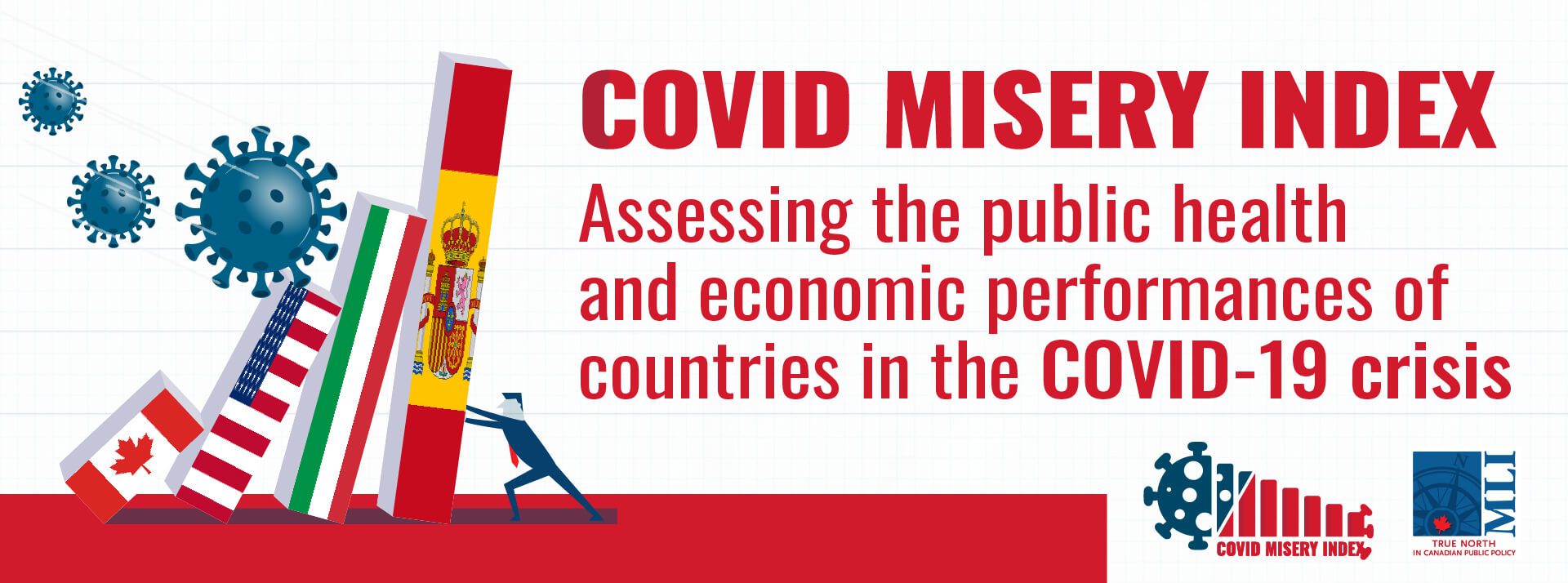View the full, updated COVID Misery Index (CMI) here. Download the data for the June 17 update here. For more information, including a full methodology and analysis of the initial CMI, click here, and view the original, non-updated CMI here.
To find all the MLI products related to the CMI, click here.
The Latest CMI
How quickly are we getting people vaccinated? How tough are the public health restrictions? How is the economy recovering? MLI has the answers with the latest update of the COVID Misery Index.
MLI COVID Misery Index Update (June 17, 2021): The Macdonald-Laurier Institute’s COVID Misery Index is updated regularly as we follow the progress of 15 developed countries to preserve the health, well-being and prosperity of their citizens during the pandemic. There are three categories: Disease Misery, a measure of the impact of sickness and death from the disease, Response Misery, a ranking of how well governments are doing on measures such as the success of vaccine rollouts or having to rely on restrictive lockdown measures, and Economic Misery, which takes into account the impact on jobs, growth and government finances.
Disease misery recedes, but Canada’s ranking falls
As vaccinations roll out around the developed world, the profile of misery caused by COVID-19 is changing. Countries, including Canada, are reporting fewer negative health outcomes. The focus is shifting away from misery caused by sickness and death from the disease itself and more towards the longer term impact of the policies that have been enacted to manage it. The economic damage and health impacts from other causes brought about by lockdown measures continue to loom large.
While Canada has had recent success in rolling out vaccines and reducing COVID case counts, other countries tracked by MLI’s COVID Misery Index have progressed as well, so Canada has in fact fallen further behind most of its peers in our rankings on COVID performance.
As we move into the second half of 2021, there is hope that we are through the worst of the pandemic and that a return to more normal lives is on the horizon. Yet despite this optimism, there remains frustration that life isn’t getting better as quickly as it could be. In the most recent rankings, Canada has fallen back to 11th out of 15 countries in the overall rankings, dragged down by particularly poor numbers for the economy.
New economic data reveal a dire situation for Canada
There are three categories for ranking the 15 countries in the index: Disease Misery, or how much sickness and death has been caused by the disease; Response Misery, which tracks how effectively countries have rolled out measures like vaccines and tests, or whether they have had to resort to lockdowns; and Economic Misery, which shows how pandemic and government policies have affected economic growth, jobs and government debt. We have updated the economic data for the first time since issuing our original MLI COVID-19 Misery Index rankings in March 2021, since economic data are released by governments less frequently. The results are striking for Canada.
While Canada’s overall Index ranking has dropped one spot from the previous update to 11th place out of 15 countries, its economic situation has been particularly poor and has deteriorated since the last update on Economic Misery.
Canada’s Economic Misery grade has fallen to an abysmal ‘F’, indicating that the financial impact of the pandemic will be felt for a long time after we have returned to normal with the disease under control. Perhaps due to the on-going lockdowns and other response measures in many provinces, unemployment remains persistently high and projections for economic recovery in the remainder of 2021 are less rosey than earlier thought. Canada’s massive increase in public debt remains a concern, as both federal and provincial response policies have burdened the country with a significant bill for battling COVID-19.
With regard to our Response Misery, Canada’s efforts to get a first vaccination to as many people is commendable and has produced good results there, although evidence suggests the new ‘delta’ variant of the disease is more resilient than others and that second vaccinations are essential to offer sufficient protection, an area where Canada is still lagging.
Competitor rankings
The results of the new data reveal some changes in the rankings of Canada’s comparator countries. New Zealand has moved into first overall, bumping Norway to second place. New Zealand’s improvement comes as a result of very low rates of disease and death and very high rates of testing, combined with a tight regime of mandatory isolation for all those entering the country. While wide-spread international travel is still some way off, a bubble with third-ranked Australia has been formed to allow individuals to travel across these two countries without facing quarantine and other self-isolation requirements. Citizens of New Zealand, Norway and Australia have been able to live with relatively few restrictions as they have experienced comparatively low rates of the disease.
The United Kingdom and the United States both rank ahead of Canada, taking 9th and 10th places respectively. While the disease certainly took a significant toll in those countries in the early stages of the pandemic, their world-leading vaccination programs have allowed them to relax public health restrictions, thereby positioning their economies for rapid recoveries through the remainder of 2021.
Italy and Spain have experienced the most misery of the 15 countries on our list, as both have suffered very high rates of disease and death, long and difficult lockdowns, and significant economic damage.
One-week and four-week results
Overall, in the past week and past four weeks respectively, Canada has performed well with administering vaccinations but continued to face relatively high rates of the disease itself, with correspondingly high hospital and ICU admissions. It is encouraging to note the emerging news that the time between jabs is being shortened in many provinces, and case counts continue to fall in most provinces, although Canada has lagged its competitors in getting past the third wave of the pandemic.
Looking ahead, we hope that Canada’s vaccination roll-out will continue at, or exceed, its current pace and that second doses are available earlier than expected to allow for public health restrictions to be lifted, borders to re-open for those who have been fully vaccinated, and economic activity to accelerate. We’re in for a long period of financial recovery, so the sooner we can start, the better.
Richard Audas, Faculty of Medicine, Memorial University of Newfoundland. Senior Fellow at the Macdonald-Laurier Institute.





